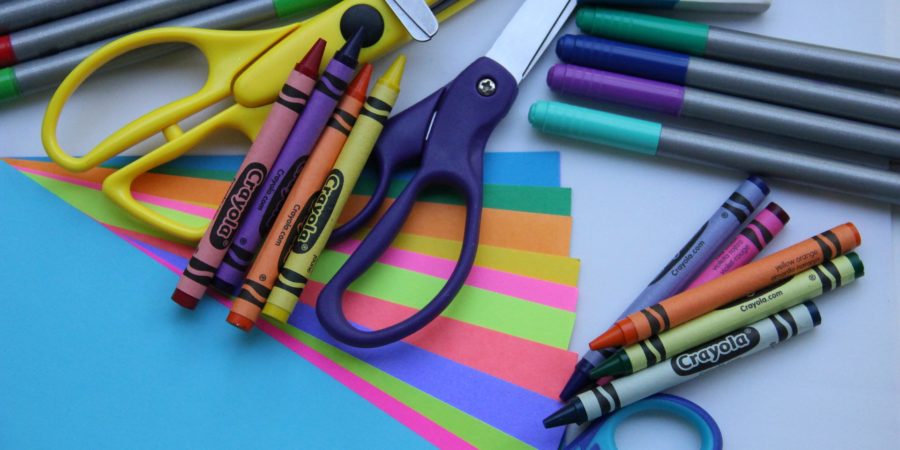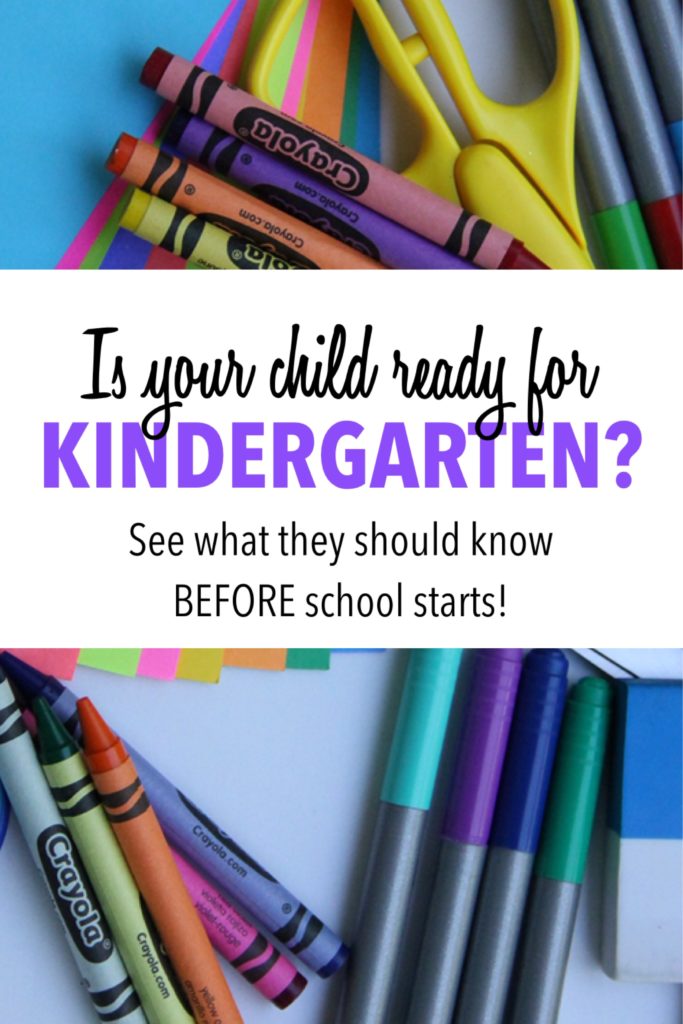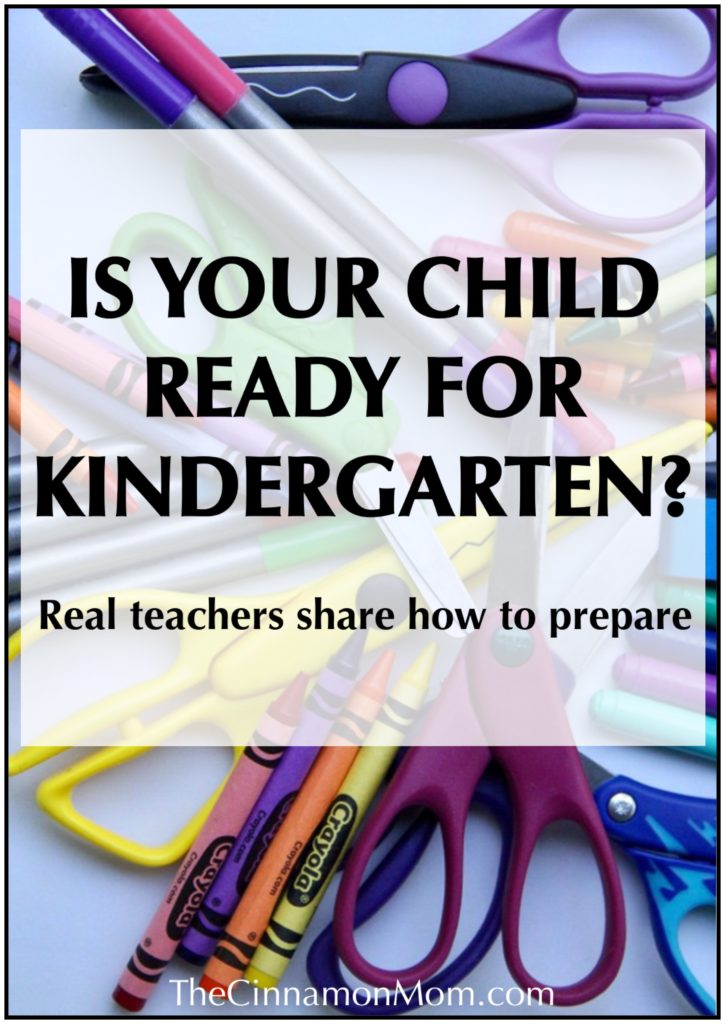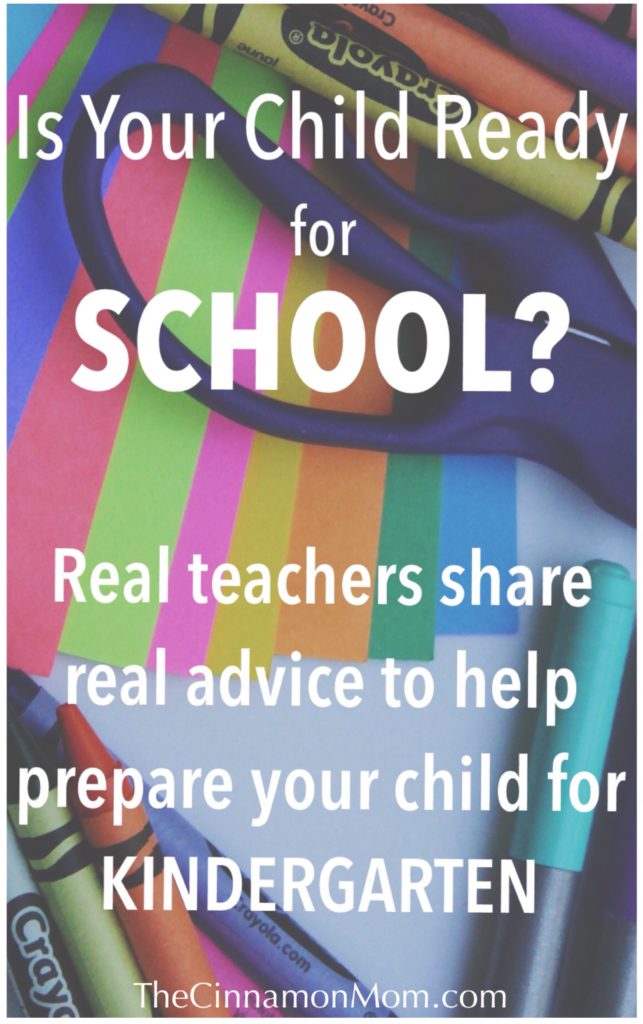Kindergarten Has Changed
Today, five-year-olds are held to much higher expectations than you can imagine. There are rigorous standards, longer school days, more standardized testing, larger class sizes, and less recess and free time than kindergarten students in history have ever had. There’s a huge emphasis on academic achievement and not much time allotted for age-appropriate social and emotional development.
Needless to say, if your child does not enter school with a very specific set of skills or abilities, they are at a significant disadvantage. And since kindergarten lays the foundation for their scholastic future, it’s crucial to give them a strong start.
As I like to remind my readers frequently, I was a kindergarten teacher before I chose to be a stay-at-home mom. I decided to reach out to a few of my friends in the education field to offer their perspectives and advice about preparing your children for kindergarten. When I was a new teacher, Kristy, Natalie, and Tiyaanah were each mentors to me and were essential to my success in my classroom. They have years and years of experience (and are all awesome mamas, too) and I’m so grateful that they’re sharing this valuable insight with you!
Here’s what Kristy, Natalie, and Tiyaanah have to say about getting your little one ready for kindergarten:
Kristy
Having taught Kindergarten for several years and now having a little guy of my own, I am often thinking of what I can do to prepare him for that first important year in school. Here are some of the things that I would tell future student’s parents about prepping their children for school:
First and foremost, read to your kids! Establishing an early love of reading and books is one of the simplest and most important things a parent can do in the early years of their child’s life. By reading daily, kids quickly learn how to turn the pages, how to hold and treat books, how to answer questions about what they are reading and follow along with the story. These skills are much harder to teach later and they are a wonderful way to bond and spend quality time with your little people.
I think children are well-prepared for Kindergarten when they can say, recognize and write the ABCs, count and write numbers 1-20, write their name and use pencils, crayons and scissors properly. These are all skills that can be taught in their first few years of life and reinforced daily at home before they start school. These basic skills will give students more confidence as they begin the huge mental and academic leaps that are now required in Kindergarten.
In addition to some of the more academic items mentioned, students who come into Kindergarten already knowing how to take turns, share, ask for help and play cooperatively on the playground seem to have an easier adjustment period. Of course, five-year-olds will always need reminders about these items, but if these skills and ideas begin at home and are continually reinforced at home, the child will be able to adapt to the rules and procedures given at school.
Natalie
The months leading up to Kindergarten can be exciting and terrifying for both the child and the parent. My own daughter will be going to Kindergarten next year (my goodness, how time flies!). As parents, we are constantly worrying about if our kid will be ready! We ask ourselves tons of questions night after night. Will they make friends? Will they listen to their teacher? Will they like school? Will they miss me? Most of these questions will continue to run through our heads until our kids are grown, but will remain unanswered (or the answer will be ever changing).
As an experienced Kindergarten teacher, there is some advice that I will give you to help prepare your little one for their school debut: READ. Read to your child every night. They will start to naturally pick up skills they will need to be successful students and scholars. They will hear and see how letters, words and sounds work together to create stories.
Try to also engage your child in meaningful and authentic conversations. Ask them about their day, and REALLY listen and engage by asking questions. Getting them used to having these thoughtful conversations will help prepare them for the type of thinking and speaking they will do in school.
No matter what happens, just love and support your child. Believe in them and in their teacher, whoever it is. Know they are there with the best intentions and have your child’s best interest at heart.
On a different note… If your child cannot tie their own shoes yet, please send them with Velcro shoes. (Tying children’s shoelaces is disgusting)
Tiyaanah
My Top 4 Tips for Kindergarten Readiness
1. Children need to feel comfortable communicating their needs to an adult (potty, thirst, hunger, likes, dislikes, etc.). It’s not something you can necessarily practice beforehand with a stranger, but just have the conversation with your child, telling them that the teacher is there to take care of them when mommy and/or daddy are not around.
One way to make the transition easier is to meet their teacher ahead of time and get a sneak peak of the classroom. Some of the most confident children can turn into very shy people in the classroom. So, if your school has a “Meet the Teacher Night” I highly suggest that you and your child attend.
You could also role play various situations that may happen inside and outside the classroom to help them learn how to navigate the problems.
2. Practice letter/number recognition, sounds, and counting 1-100. This does not have to be structured in a formal way. Just simply talk with them on a daily basis about the letters and numbers they see around the house and outside on billboards or signs. You can count random items outside or their toys or the amount of ingredients you use when cooking. If you’re into technology, there are a lot of games children can play that will help them with developing these skills.
3. Help them learn to orally spell their name. If they can write it, that’s a bonus! It’s just really helpful when incoming students can spell and recognize their name. They are better prepared to learn how to write it.
4. Practice using pencils, crayons, glue, paint, scissors, and any other school supplies. Students need lots of practice with these different tools because they will be used often. When a child enters school knowing how to use these supplies, they’re able to focus on completing their assignments, rather than focusing on how to use any of the mentioned school supplies.
Did you take good notes?
Each of these wonderful teachers offered so much important information! Unfortunately, if you wait until the week before school starts to start preparing, you’re too late. But if you start taking their suggestions now (the earlier the better), you have plenty of time to instill important school skills.
Even if your child attends preschool or daycare, there is no substitute for parent involvement. As one of my other buddies in education always says, “Parents are their first teacher!”
Take that responsibility seriously and make the time to work with and talk to your kids daily. Trust me, your child’s teacher will notice and thank you!
When will your children start kindergarten? Have you started preparing them?
Check out this post about our first week of homeschooling for fun learning activities for toddlers!
And find out what school supplies are on your teacher’s wish list!
Talk to you soon!







I love this article, its such a relief to know I am not the only one that worries about a lot of the things mentioned above! It is also a huge relief to know we are on the right track for my oldest who will start kindergarten next year. Thank you for giving me a piece of mind as to where my family is rolling into the schooling years for the first time.
You’re welcome! There’s so much to know, but the fact that you’re already looking ahead is a great sign!
Thanks for the tips! My son will be starting kindergarten in September 2019!
You’re welcome! That’ll be here before you know it!
Thank you so much for sharing! My little guy starts kindergarten August 19! We have some work to do lol!
That’s so exciting! Kids this age are sponges. Just find little ways to practice each day, while eating breakfast or playing in the bathtub, and he’ll be ready in no time!
It is so helpful to know what the real expectations are. I had a friend who didn’t get why her son wasn’t ready but she had no clue.
There’s so much for kids to know. It can easily become overwhelming!
This is very informative for parents wondering about child readiness for school. Thanks for sharing!
You’re welcome! Thanks for reading!